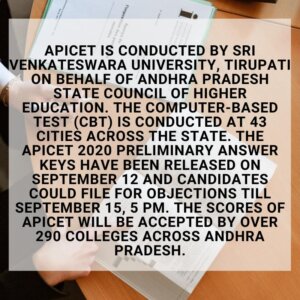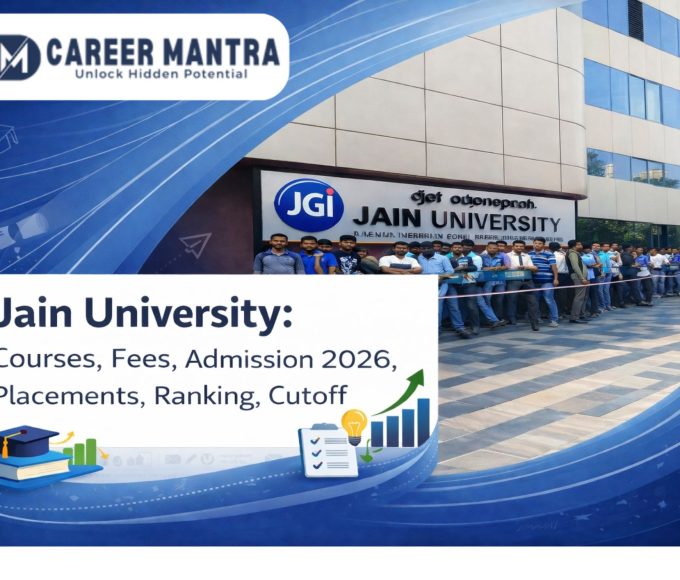APICET 2024-25
What is APICET 2024?
Andhra Pradesh Integrated General Entrance Test (APICET) is a state-level MBA and MCA entrance examination conducted for admission to colleges in Andhra Pradesh. APICET is headed by Sri Venkateswara University, Tirupati, on behalf of the Andhra Pradesh State Higher Education Council. The APICET 2024 test date will be announced soon.
Highlights
| Name of Exam | Andhra Pradesh Integrated General Entrance Test 2024
OR APICET 2024 |
| Conducted by | Sri Venkateswara University, Tirupati |
| Exam level | State-level |
| Mode of application | Online |
| Mode of exam | Online |
| Exam duration | 150 minutes |
| Question type | MCQs |
| Language | English |
| Official website | www.sche.ap.gov.in |
Important Dates
| Event | Date |
| Beginning of registration | to be announced |
| Last date for applying | to be announced |
| The last date for applying with a fine | to be announced |
| Exam centre correction | to be announced |
| Application correction | to be announced |
| Release of admit card | to be announced |
| Exam | to be announced |
| Release of answer key | to be announced |
| Filing objection about answer key | to be announced |
| Results | to be announced |
Eligibility Criteria
Applicants seeking admission to MBA courses through APICET 2024 should meet the following criteria:
- The candidate should be an Indian national and comply with the requirement of local / non-local status as per government rule.
- Applicants should have earned a three-year Bachelor’s degree in either stream with a minimum of 50 per cent (SC, ST and BC with a total of 45 per cent) from a recognised university.
- Applicants in their final year of a 3-year Bachelor’s degree and pending results are also eligible to apply for the APICET 2024 exam.
Admission Procedure
Step 1: Fill out the application form
Applicants planning to appear for APICET need to fill out their application form online. Applicants are advised to review the eligibility requirements before completing the APICET application form. The application form can be found on the official website.
The fee for the application is ₹ 550. The fee can be paid by:
- AP Online Centres / e-Seva Centres
- E-Seva Centres at Andhra Pradesh
- Payment by credit card or debit card online
Step 2: Download the APICET 2024 Admission Card
Applicants who successfully register for the examination will be given the APICET Admission Card. Test users can visit the official website and download the Admission Card. Applicants need to take a scanned copy of the admission card and bring it to the Exam Centre.
Step 3: Appearance for APICET 2024
The APICET 2024 exam is performed in online mode for 2.5 hours. Applicants must take the test at their respective examination centres. The question paper consists of 200 MCQs from Analytical Ability, Mathematical Ability and Communication Skill. Check the theme-wise marks in the infographic below.
Step 4: Review the results of APICET 2024
The Results of the APICET 2024 will be announced on the official website. Candidates can verify the same by entering the ticket number in the hall. Candidates seeking to have their APICET 2024 score re-assessed can apply for this within 15 days of the result declaration.
Step 5: Counselling
The APICET 2024 counselling will take place at an early stage in October. Candidates must be present in person for a round of therapy. During the therapy process, there will be record checking. When this is completed, the applicant will be able to execute a web-based screening process.
Score Accepting Colleges
There are over 349 colleges and institutes that accept the APICET score for admission to MBA and MCA programmes. Please review the list below:
- University of Andhra
- Acharya Nagarjuna University
- Andhra Loyola College
- Jawaharlal Nehru Technological University
- Vishwa Vishwani Institute of Systems and Management
- Gayatri Vidya Parishad College, Visakhapatnam
- ICBM-School of Business Excellence, Hyderabad
- Vignan’s Foundation for Science, Technology and Research, Guntur
- KL Business School, KL University, Guntur
- DCM – Dhruva College of Management, Hyderabad
APICET 2020 Exam Pattern
A total of 200 questions will be dealt with in the examination, divided into three sections. The break-up of the APICET 2020 question paper is given below.
Section A: Analytical Ability
- Data Sufficiency – 20 questions
- Problem Solving –55 questions
Total 75 questions
Section B: Mathematical Ability
- Arithmetical Ability – 35 questions
- Algebraical& Geometrical Ability –30 questions
- Statistical Ability – 10 questions
Total 75 questions
Section C: Communication Ability
- Vocabulary – 10
- Business and Computer Terminology – 10
- Functional Grammar – 15
- Reading Comprehension -15
A total of 50 questions
Note: The exam will test candidates’ ability to think critically and systematically about verbal and mathematical problems. The evaluation will also reflect on the accuracy capacity of the candidates. Applicants are therefore required to follow the instructions carefully. Do not tick the answers without reading the question carefully. Do not tick two answers to any question, as no answer will be given in such a situation. Candidates must follow the directions carefully.
Syllabus
The APICET 2024 syllabus is prescribed by APSCHE and covers important topics related to Analytical Ability, Mathematical Ability and Communication Ability. Since the question paper for both MBA and MCA courses is popular, the syllabus is the same. Applicants preparing for APICET 2024 must plan syllabus-relevant topics to score well. Check below for the APICET 2024 syllabus and topics section-wise.
Section A: Analytical Ability
- Data Sufficiency
Data-based questions are in the form of two statements classified as (i) and (ii)
- Problem-Solving
Sequences and Series (Number and alphabet analogies, completion of blank spaces following a trend in a: b: c: d relationship, missing number in a sequence or series)
Data analysis (data will be displayed in Table, Graph, Bar diagram, Pie Chart, Venn Diagram or Passage and questions relating to the data need to be analysed)
Coding and decoding problems (A code pattern of the English alphabet will be given. A given word or group of letters must be coded or decoded based on a given code or code)
Date, Time & Arrangement Problems (Calendar Issues, Time Issues, Blood Relationships, Arrivals, Departures and Schedules, Seat Arrangements, Symbol and Notation)
Section B: Mathematical Ability
- Arithmetical Ability
Laws of Indices, Ratio and Proportion, Surds, Numbers and Divisibility, LCM, GCD, Logical Numbers, Ordering, Percentages, Benefit and Loss, Relationship, Pipes and Cisterns, Time, Distance and Work Problems, Areas and Quantities, Calculation, Modular Arithmetic
- Algebraical& Geometrical Ability
Statements, truth tables, converse and inverse consequences, tautologies-sets, relations & functions, implementations – line equations in various ways.
Trigonometry-Trigonometric ratios, Trigonometric ratios of standard angles, (0 °, 30 °, 45 °, 60 °, 90 °, 180 °): trigonometric identities: sample problems in heights and lengths, polynomials, residual theorems & implications, linear equations & expressions, progressions, binomial theorems, matrixes, limit and derivative notions, plane geometry-lines, triangles, quadrilaterals, circles, coordinate.
- Statistical Ability
Frequency distribution, mean, median, mode, standard deviation, correlation, probability
Section C: Communication Ability
Vocabulary (Identification of vocabulary used in day-to-day communication.
Business and computer terms (Identification of basic terminology and principles in computer and business contexts (letter, study, memoranda, agenda, minutes, etc.)
Functional grammar (understand the use of grammar in day-to-day communication as well as business contexts)
Comprehension of reading (3 passages)
Applicants will be tested under Section C on the following aspects:
- Ability to recognise the words used in everyday communication.
- Understand the use of English grammar in everyday communication and business contexts.
- Identify common terms and definitions in computer and business contexts such as letters, papers, memoranda, agendas, minutes, etc.)
- Understand written papers, conclusions, etc. and draw inferences.
Check Out Our Website –
Website –
More Informative blogs –






